At the epicenter of the earthquake, anger grows at lack of response: ‘People are pulling stones out with their bare hands’
Ahmed, 80, is alive today because minutes before the quake he went out to scare away the wild boar in his orchard. In his village of 500 inhabitants, 37 people were killed
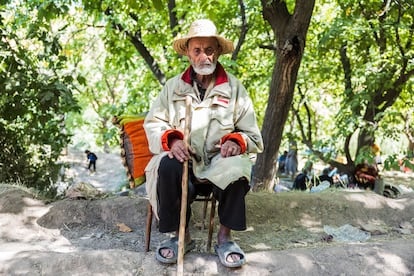
Sometimes, an unexpected decision, a stroke of luck, saves your life. Ahmed Ait-Hamed’s luck was twofold: good and bad. After 11 p.m. last Friday night, the 80-year-old remembered the wild boars that every night come foraging for the apples in his orchard and decided to leave his house with his walking stick to scare them away. Once there, the earth shook and the roof he was standing under just minutes earlier collapsed. Underneath were his wife, Fatma, one of his sons, his daughter-in-law, Saida, and two of the latter’s four children. No one can explain how the other two, a boy and a girl aged 14 and 11, were saved.
Ahmed is the paradigm of this area of Morocco, where large families with many children are forced to migrate to the cities given the scarcity of what the countryside provides. Of their four children, three left years ago for Casablanca to work in the textile industry. Only Saida’s husband had remained with him.
The Seville Emergency Medical Care Service (SAMU) from Spain was the first rescue team to arrive in Anerni, one of the closest villages to the epicenter of the last week’s earthquake, 80 kilometers (50 miles) from Marrakech. There is no road here, only a track that, after the earthquake, was rendered impassable by falling rocks. Two days later, it had been more or less cleared and vehicles began to arrive.
During the 48 hours in which this village of 500 inhabitants was isolated, a group of villagers led by Said pulled 37 of their dead neighbors from the rubble themselves. With only their picks, shovels, hoes and crowbars, they also saved many others, like I., aged 10, fatherless and now left without a mother and sister by the earthquake. The boy is alone and wanders around the village. He shows the wounds caused by being buried for two hours. He smiles.
The SAMU medical rescue team, led Borja González, asks about people who may still be alive. But the members of Said’s crew ask him instead to help them pull out the dead. He says there are no more survivors. They tell them about Saida, 48, Ahmed’s daughter-in-law. They have already pulled out the bodies of her husband and children. Ahmed’s wife was found on Tuesday morning. It was still warm, according to her relatives.

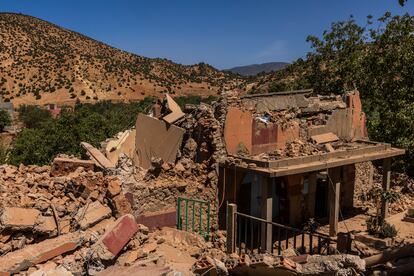
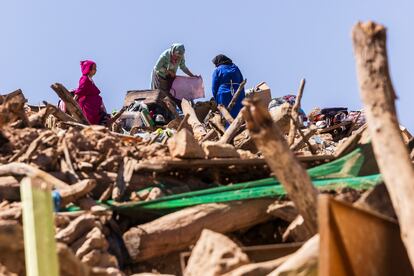
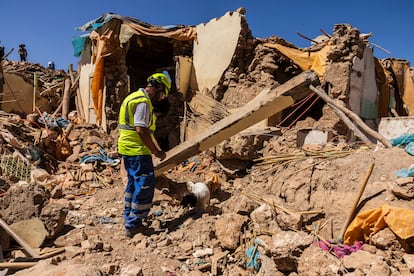
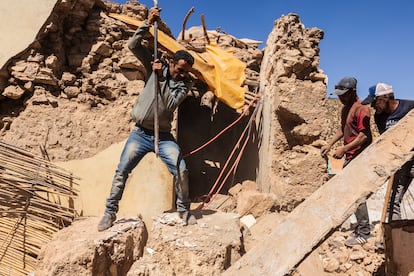
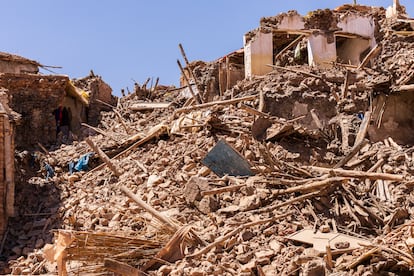
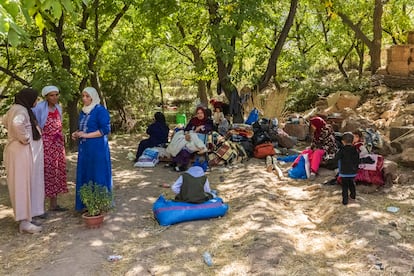
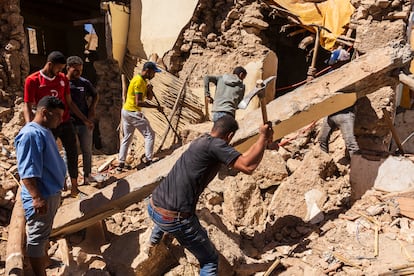
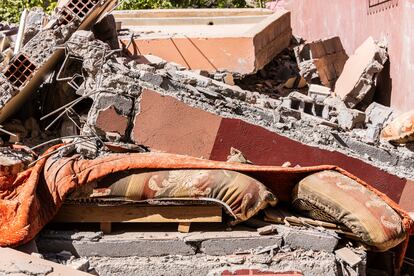
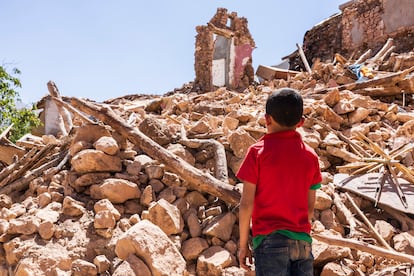
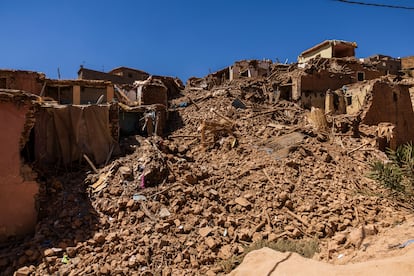
“It is practically impossible for us to find anyone alive,” says Carlos, another member of the SAMU team. “We are facing a very dispersed tragedy and it has taken a long time to be able to act,” he adds. “The type of construction doesn’t help either. They are stone and mud houses with wooden beams. They collapse without leaving air pockets to allow people to breathe.”
González and his men, who have two canine teams, start searching. Carlos arrives with some important information: Saida’s 11-year-old daughter, one of those who survived, says that at the time the house collapsed, her mother was in the kitchen. Said and his crew point to the exact spot where that room was. It’s time for Homer and Briska, the two dogs that accompany the SAMU team, to be deployed.
“These dogs are trained to look for living people, not dead ones,” explains Antonio Miranda. “When they smell someone alive in the rubble, they mark it by standing on the exact spot and barking,” he adds. “However, searching for the dead is much more difficult for them because of the decomposition of the corpses. They prowl around where they are, and they go crazy. But they’re not as accurate.”
Miranda, who is responsible for Homer, is the first to act. He sends his dog over the rubble of what used to be the kitchen. Homer sniffs, turns back, but always returns to the same place. To confirm the spot, Juan Hidalgo, from the second canine team, releases Briska, who indicates the same place. Neither of the dogs barked. The SAMU team tells the residents that this is the exact spot to clear. Said’s team, armed with their rudimentary tools, starts moving rocks.
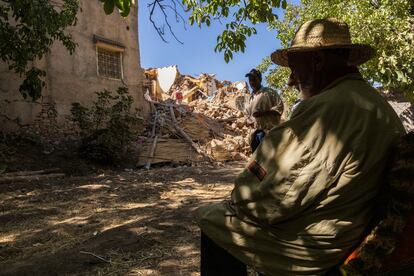
“We can’t stand around, we have to do something,” say the villagers, who pick up the huge stones so they can carry them away and make their way to the body. Some of the onlookers are suspicious of the dogs’ judgment. They say that next to the place they have pointed out there was also a stable, with several goats and a donkey; they could have detected that. But the work does not stop at this one-story pile of stones: the house had two floors.
Ahmed contemplates the rescue of his daughter-in-law sitting on a chair and leaning on his cane. With his eyes red from crying, he receives relatives and friends who kiss his forehead and offer their condolences. “May God reward you abundantly,” they tell him in tears. “It is God’s will,” he replies.
His son Mohamed, 52, hugs him. He has just arrived from Casablanca with several of his co-workers who want to lend a hand. They all embrace the old man, who remains seated. He complains that no one has helped them over the past two days. “If they can’t come, let them at least leave us the tools to do it ourselves,” he says. “With proper machinery, we would have had this up in hours, but look at what we are working with; the people are pulling stones out with their bare hands.”
“Maybe if the Spaniards and their dogs had arrived two days ago, we could have pulled them out alive,” he concludes.
Sign up for our weekly newsletter to get more English-language news coverage from EL PAÍS USA Edition
Tu suscripción se está usando en otro dispositivo
¿Quieres añadir otro usuario a tu suscripción?
Si continúas leyendo en este dispositivo, no se podrá leer en el otro.
FlechaTu suscripción se está usando en otro dispositivo y solo puedes acceder a EL PAÍS desde un dispositivo a la vez.
Si quieres compartir tu cuenta, cambia tu suscripción a la modalidad Premium, así podrás añadir otro usuario. Cada uno accederá con su propia cuenta de email, lo que os permitirá personalizar vuestra experiencia en EL PAÍS.
¿Tienes una suscripción de empresa? Accede aquí para contratar más cuentas.
En el caso de no saber quién está usando tu cuenta, te recomendamos cambiar tu contraseña aquí.
Si decides continuar compartiendo tu cuenta, este mensaje se mostrará en tu dispositivo y en el de la otra persona que está usando tu cuenta de forma indefinida, afectando a tu experiencia de lectura. Puedes consultar aquí los términos y condiciones de la suscripción digital.








































